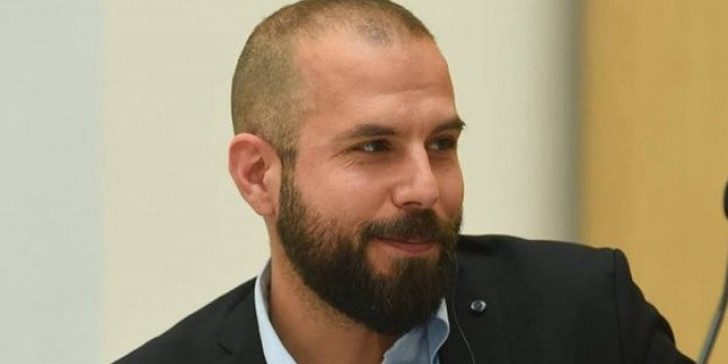Antonis Tzanakopoulos is Associate Professor of Public International Law at the Faculty of Law and Fellow in Law at St Anne’s College, University of Oxford. He has taught as a visitor at the Universities of Paris (Paris X – Nanterre), Angers, London (King’s College), Athens (National and Kapodistrian), at the Interdisciplinary Center (IDC) in Herzliya, and at the China University of Political Science and Law in Beijing. He was previously lecturer in international law at University College London and at the University of Glasgow. Antonios has also delivered a special course at the Xiamen Academy of International Law in 2017 and has been invited by the Curatorium of The Hague Academy of International Law to serve as Director of Studies in 2021.
Tzanakopoulos studied law in Athens, New York, and Oxford, during which time he also worked as a Researcher for the Hellenic Ministry of Foreign Affairs in Athens and New York and for the UN Office in Geneva, and as a Graduate Teaching Assistant for the Faculty of Law at Oxford. He is a general international lawyer and has published in a number of areas reflecting his varied research interests. His books include Disobeying the Security Council (OUP 2011) The Settlement of International Disputes (Hart 2012), The UN Convention on Jurisdictional Immunities of States and their Property (OUP 2013) and the Research Handbook on the Law of Treaties (Elgar 2014). He has also published in the fields of the law of the sea, international investment law, and others.
In his interview with the Press and Communications Office of the Embassy of Greece in London, Antonis Tzanakopoulos talks about the Prespes Agreement, issues of Greek Foreign Policy, the Brexit perils and globalization.
Professor Tzanakopoulos, you have developed a long and illustrious career in Public international Law both as an academic and as a state and international organisations and private entities expert and advisor on international law issues. What has motivated you to develop such a keen interest in international law? What challenges does each of these capacities (academic and expert) pose to you?
Thank you for your warm words. It is difficult to trace exactly where the interest in international law came from. I guess it is due, in equal measure, to an early fascination with the vocabulary used by lawyers, this exotic language that is not understood by outsiders, and to an interest in (international) politics and history developed during my secondary education. In school I participated in Model United Nations competitions, and then in the first year of law school in Athens I had some fantastic professors teaching international law. This pretty much sealed the deal early on. Since then, I have been in a love-hate relationship with the subject, which continues to fascinate me.
As for my two distinct roles, that of an academic and that of a practicing international lawyer, the biggest challenges that they pose are the pressure that is put on my time, leaving space for little else, and the care that is required that neither is ‘left behind’. But being able to act as both is hugely rewarding, as doctrinal analysis, legal practice, and teaching are in a constant feedback loop with one another. Each informs and is informed by the other, and this allows one a good and inclusive view of the whole field.
You have had an extensive academic career in the UK. How do you compare the academic environment and educational system of the country to the Greek equivalent?
A very difficult question. Each have their own significant upsides and downsides. Trying to be diplomatic (this is an Embassy newsletter after all), I would say that, when it comes to tertiary education, UK facilities and organisation are an obvious plus (which, it could be said, is quite a minus in Greece), but on the other hand it cannot be ignored that this comes at what I think is an enormous cost to the students in terms of fees (and consequently also access). Greece, despite various problems including chronic underinvestment, has excellent – and indeed consistently excellent – quality in the education provided at the tertiary level. This is evident in the disproportionate number of Greek-university-educated students accepted for postgraduate degrees in top UK universities.

Greek PM Alexis Tsipras and North Macedonia PM Zoran Zaev (Wikimedia Commons)
Despite the international community considering the Prespes Agreement to be an important step in promoting peace and stability in the Balkan area and an ideal way to resolve an almost thirty-year-long bilateral dispute, some Greek political groups and part of public opinion did not accept this view. What do you think about the future of this agreement? Which factors do you think will influence the agreement’s success in the future?
The Prespes Agreement is a very significant achievement, not only for Greece, but also for the Balkans. And even beyond our immediate neighbourhood, it provides a blueprint for the resolution of highly politicised and highly sensitive disputes between states that touch upon such sensitive areas as history, ethnic origin, culture, and so on. In my view, the Prespes Agreeement is extremely beneficial for Greece on a number of levels: not only does it reverse a situation where the vast majority of States in the world had recognized our neighbour with its former constitutional name, ie the Republic of Macedonia, it also safeguards Greek history and culture (in particular through Article 7), and opens up a great number of areas for cooperation with one of our closest neighbours.
Now, it is true that, as you say, some political groups and a part of public opinion were not ‘convinced’. However, I should distinguish between the two, as I do not think that both are ‘unpersuaded’ for the same reasons. As far as part of the political establishment is concerned, it is clear to me that they have no substantive reason for being unpersuaded. They raise hollow legalistic points, which have been responded to convincingly by both local and international legal scholars (eg with respect to the term ‘nationality’ and what it means, or with respect to provisions regarding trademarks etc). But they use these points, which are necessarily obscure to the great majority of lay people, not because of genuine concern (as the points are baseless), but rather in order to avoid proper political engagement with fundamental points about what Greece is and how it should be conducting its policies towards its neighbours, as well as about how we as Greeks understand ourselves and our history. Their nationalist rhetoric is rather aimed at provoking sentimental reactions, and parts of the Greek population have fallen for that. This is understandable, but very very dangerous indeed. However, I think there has been a serious attempt on the part of those who are in favour of the agreement to lay to waste the legalistic arguments of the deal’s opponents, and to explain and expose the deep insecurities that we must address as a people. The way to do this is not to take it out on a small state to our north, but rather to seek peaceful cooperation.
As for the deal itself, I think it is a blueprint for the resolution of relevant disputes globally. It contains a number of mechanisms in order to safeguard its full and fruitful implementation, and these constitute an excellent insurance policy for the future. These include cooperation commissions in various subject areas, as well as carefully calibrated dispute settlement mechanisms. The agreement is already seen as a paradigmatic achievement, and in a few years it will have proven its worth, even for those in Greece that are currently criticizing it.
How would you comment on the efforts of the Greek government both to develop a more outward looking foreign policy and upgrade Greece’s role in the Balkans and East Mediterranean? Based on your experience as a scholar living in the UK, how do you think Greece’s efforts to play an active role in the East Mediterranean are viewed by British foreign policy that historically has had an interest in this area? Do you think that there may be a revived interest of the UK in the region of East Mediterranean?
Outward-looking foreign policy is, in my view, the only proper policy for a state like Greece, with its strategic geopolitical position in the Eastern Mediterranean. It is an excellent opportunity for Greece to take initiatives at a time of turmoil in the region, and to show itself as the trusted, stable partner that conducts itself in accordance with international law and in a cooperative spirit. The UK will certainly welcome a stable European regional power taking an initiative in what has traditionally been a turbulent area of the world.
What will, in your opinion, be the challenges for Greece’s foreign policy in the coming years?
I think a major challenge will be to capitalise on this new outward-looking foreign policy and its initially fruitful results. Resolving disputes with our neighbours, in particular maritime delimitations that will enable us to make use of resources in the sea that have been ‘locked into’ disputes, the Cyprus problem, and so forth, should be at the forefront of our policy, as indeed it is, and will present challenges, but not challenges that we cannot deal with. With each issue we resolve, each challenge that we deal with, we strengthen Greece’s profile and reputation, as we strengthen the country’s development potential.

(Wikimedia Commons)
The referendum on the UK’s future in the EU has brought an extended political dispute to the country, which after three years is still an unresolved issue. What is the cause of this delay and do you think that the situation could be considered a “constitutional crisis”? And if so, what does this crisis entail?
Another huge question (or rather set of questions) that I will try to deal with as succinctly as possible. First of all, the cause of the delay lies in the fact that the UK government made undeliverable promises in the aftermath of the Brexit referendum. The adoption of a hard Brexit stance, promising that the UK would exit both the common marked and the customs union, all the while ensuring access to that market on favourable terms, basically meant that the UK government had to achieve the unachievable. While this bought the government some time domestically, at the level of negotiations with the EU it became clear very quickly that the UK could only achieve a deal along the lines of the one it presented to Parliament at the end of 2018. Such a deal would (and did) ultimately alienate both the hardliners, who wished for a clean break (which would come with enormous economic pain) and who had been placated and encouraged by the government’s initially hard stance, and those who would looked to a soft Brexit in order to honour the referendum result but also to ensure continuity and close cooperation with the EU for a minimum of economic harm to the UK.
All this came to a head in Parliament when the latter came to vote (repeatedly) on the deal, with the government playing for time in the hope that a looming no-deal Brexit would force MPs to ‘hold their nose’ and approve the deal. This strategy failed, and for a number of reasons: the expectations that the government’s hard stance had created in the hard-Brexiteers, the disastrous decision of Theresa May to go to an election in 2017 which resulted in her loss of a parliamentary majority, the further disastrous decision not to try and foster some sort of cross-party cooperation in view of the wholly foreseeable split between hard and soft/no Brexit in the ranks of MPs from both major parties, and the general lack of flexibility for Tory party-political reasons. All this has led us in the midst of a full-blown constitutional crisis which has harmed the image and reputation of the UK and its political system, and which it will take a long time to recover.
The crisis, however, was not inevitable, as should be evident from what I have already said. A more sensible policy would be a far less rigid interpretation of the referendum result, with a concomitant attempt to achieve some sort of national and parliamentary consensus as to what the national line of negotiation would be. Here is a counter-example, which, if it did not avoid vigorous parliamentary battles, did in the end achieve the ratification of a major deal: Greece established a national negotiating line as to how to resolve the Macedonian name issue in 2008, and the Greek government delivered on this fully in 2018. This led to the ratification of the Prespes Agreement in parliament despite the SYRIZA government also being a minority government, as is the Tory government in the UK.
What do you think will be the consequences (economical and political) of Brexit to the European entity? In particular, do you think that Greece could be seriously affected by Brexit?
This question is difficult to answer, as it is currently still unclear what form Brexit will take. Barring any sort of no-deal Brexit, the consequences for the EU will be minimal, even if they will be significant for the UK. Greece will not be seriously impacted in any such situation.
What is at stake as regards to the outcome of the EU Parliamentary election in May?
Quite a lot, in particular in view of current polling, which shows a significant rise in the representation of anti-European voices from the right and far right in the next European Parliament. I fear that this will be detrimental to the European project, whatever view one might take of its development and success thus far. I would say that it is important to respond to such extremist, nationalist, divisive views as those coming from the far right not by reiterating how fantastic the European project and the EU really is, but by acknowledging that many things need to be revisited, re-discussed, and potentially changed in the European Union. It is ok to be pro-Europe and take a critical stance towards the manner in which the European project has developed and what it has become. Unfortunately, politicians think that people have little appetite for nuance and for complex arguments. This is where they lose to the far right: the far right will make a simplistic, clear argument against the status quo which is far more convincing than any attempt to make a simplistic, clear and convincing argument in favour of the status quo—this will just alienate all those who are clearly unhappy with it and for good reason. It is thus upon those of us who are serious about Europe to put forward a nuanced argument in favour of Europe, recognizing its shortcomings and the need for fundamental reform. This is the only way to get those who are currently disenchanted to dismiss the extremist anti-European voices and to join in an attempt to construct a Europe that works for the European peoples.

For more than 2 decades globalisation and the fierce opposition against it has seemed like an unstoppable phenomenon. This can be seen in interactions on a commercial, transactional, governmental, cultural and societal level. What is your opinion on the phenomenon?
Well, to the extent that anybody could have an opinion on a fact, and globalization is a fact, not a policy, I would say that it is obviously here to stay. However, we should be careful when using the term globalisation, in particular when also coupling it with ‘opposition’ to it. I am not aware of any serious opposition to the increasing interaction of people, governments, traders, professionals, cultural groups, political groups, etc, beyond borders—unless of course you are referring to marginal communities that refuse to use electricity and eschew contact with modern technology and the outside world.
Globalisation as a phenomenon is neither good nor bad. It is just a fact of life, given the tremendous technological advances in all areas and types of communication over the last decades. There is of course opposition, but it is opposition to particular kind of globalisation: globalisation of capital, globalisation of one particular political agenda, globalisation of certain economic actors who dominate areas of economic activity around the world, globalisation, in short, that is neoliberal in character. I think that this is understandable, and indeed right. People should fight against the type of globalisation that they do not want, and seek to promote the type of globalisation that they do wish to see—such as for example the globalisation of environmental standards of protection, of equal rights, and of equality and solidarity more generally.
Globalisation has set some important dilemmas to nations, governments, political actors, public opinion influencers and social communities: is it possible to bypass the national sovereignty of a country when there is a human rights violation taking place? How legitimate is the intervention of the international community as regards the reinstitution of democratic institutions and the protection of freedom and human rights?
This is a question on which I could be talking for a very long time, as I have written about it and it is close to my heart. Legally, and in short, we do have means of intervention in cases of violations of human rights, humanitarian norms, and other rules of international law. It’s called the United Nations, and the Security Council has the power to take significant measures, including through armed force, in order to maintain or restore international peace and security wherever this is threatened. And even the UN General Assembly can intervene when the Security Council is unable to act due to the veto of a recalcitrant permanent member of the Council, through the process established by the Uniting for Peace resolution.
Even states can individually or in groups take measures that put pressure on states that violate human rights, whether lawful but unfriendly measures (such as downsizing diplomatic representation, withdrawing voluntary aid, refusing to invest or to make trade deals etc), or even countermeasures, ie violations of the law towards the target state that are taken in response to that state’s violations of human rights or other international legal obligations.
And international civil society can also take measures to intervene in such situations and put pressure on states that violate international law. What is however illegal, and in my view never legitimate, is unilateral intervention by states into other states through the use of armed force. Forcible intervention under the pretext of protection of human rights or of democracy has always proved to be simply a cover for far less honourable intentions, and—more importantly—has always singularly failed to protect democracy or human rights. Note that I am talking about unilateral intervention, ie intervention by one or a few states deciding for themselves, and not about intervention by the international community through the collective decision of a global organisation such as the UN.
Would you say that we are currently living in an increasingly inward-looking world, with a tendency to protectionism, strict borders, nationalism and traditionalism, or on the contrary do you believe technology and international shared interests will boost the ‘global village’ no matter what?
There is nothing ‘natural’ or deterministic about where we are and where we are going. This will be determined by the political decisions that we make, about whether we will understand that we need global action to protect the environment, to reverse the trend of ever-expanding growth and neoliberal policies which hurt both the people and the planet, and so forth. Action to address these issues will hopefully lead to a global village living in peace, equality, and solidarity. This is within reach. But continuing on the current trend will just lead to a global village of capital in increasing contrast to centrifugal, nationalist, tribalist, and far-right forces.
There is a growing perception that international law is impotent, that there is no effective sanction for its violation. As one reads about civil wars, humanitarian crisis, abuses of human rights, torture and mistreatment of prisoners, we see a very casual attitude taken towards the Geneva Convention, as if this is not binding legislation. Would you agree with such a perception? What threats would such an attitude provoke for the international community?
I do not agree with this perception. International law is a peculiar area of the law. It deals with states, that is to say with quintessentially imaginary entities, entities that do not actually exist except in our minds and constituted there as entities by the law itself. This is the concept of a legal entity, of which the state is one. We tend to anthropomorphise the state, to imagine it as being a unitary entity that acts, feels, and thinks like a natural person, like me and you. This leads most people to imagine that states ought to be ‘punished’ when they violate the law, and that law which does not lead to court cases and to corporeal sanctioning of sorts is not really law. This is a fundamental error in thinking if one wishes to understand how international law operates.
Sanctions do exist, and while they are not always as effective as we might wish, they do serve to induce compliance with international law. Violations of international law, however, are best averted through the fear of sanctions, reputational costs, financial costs, cooperation costs, and others (which is the case, by the way, with all law). This is a long discussion, which I do hold with my students in Oxford at the start of each academic year. It would take too long to discuss further here, but I am happy for those interested to join us in Oxford for a course on public international law!
Finally, it is important to highlight how the expression ‘international law is impotent’ tends to anthropomorphise not the state this time, but the law! International law cannot be powerful or impotent. International law is simply rules made by states, and its content depends on the decisions and behaviour of the states, who are the makers of international law. So whatever qualms we may have regarding the power and content of international law, we only have our states, and thus ourselves, and the policies that we enable in our states, to blame.
Given the disputes among UN Security Council members (US-Russia, US-China, UK-Russia, UK-France concerning Brexit), how effective could the Council be in deciding to maintain international peace and security, in developing friendly relations between countries, in cooperating to solve international problems, in promoting respect for human rights and in coordinating the actions of member states?
The Security Council is legally awesomely powerful. The UN Charter gives the Council very significant powers of intervention in all sorts of issues. Also, the Security Council has demonstrated, that it can use that power to good or bad effect, as well as that it may be relegated to impotence because of political and legal disputes between its permanent members. I have written a whole book on this issue, called Disobeying the Security Council and published by Oxford University Press, and given relevant lectures, one of which is available for all to watch on the website of the United Nations Audiovisual Library of International Law. There I argue that the Security Council can be a fantastic and a terrible tool, and it depends on how states decide to use it, if at all. In short: the Security Council can harness enormous power when states decide to act together. But please do not assume that when states, and in particular the permanent members, decide to act together, this is necessarily for what you or I would consider a ‘good cause’. Sometimes disagreement between the states means precisely that there are issues that need to be resolved and agreed upon before these awesome powers of the Council are used.
To conclude, what do you think are the biggest challenges to both the international law and International law organizations at the moment?
I think the greatest challenge of our time is climate change and the protection of the environment. But this also relates to the dominant economic model around the world, which is not sustainable. Our fixation with growth and profit will be detrimental to the planet and to all of us. But this is not a challenge for international law: it is a challenge for international and national politics. International law has the tools, very effective tools, for dealing with these issues. What is lacking is not international law, but political will to use it to address global challenges. It is this political will that we should work towards creating, and international law will be there to give us the tools that we need to put it into effect.
Source: Press and Communications Office of the Embassy of Greece in London














